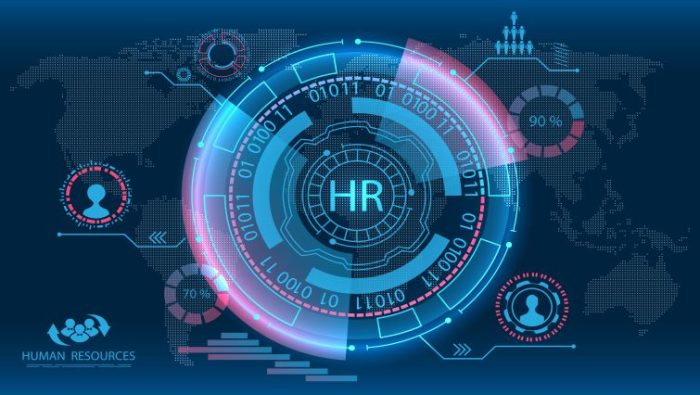7 Major 2023 HR Trends
 Publié le 1 February 2023
Publié le 1 February 2023
You can improve your workplace, prepare for the future and help make your employees satisfied by being prepared for the 7 major 2023 HR trends.
The start of the year is a time for businesses to look ahead over the next 12 months, set goals and determine exactly what is needed to accomplish them. 2023 finds industries still adjusting to the effects of the COVID-19 pandemic, which still causes a number of health issues, supply chain complications and a drastic shift in the daily nature of work for many people. This means the Human Resource Managers must realize that the needs of employees and potential job candidates have changed as well. HR managers need to take the time to review the 7 major 2023 HR trends affecting the workplace this year.
7 Major 2023 HR Trends
- Remote/Hybrid
- Flexibility
- Support
- Trust
- Inclusivity
- Benefits
- Artificial Intelligence
Remote/Hybrid
Remote and hybrid working arrangements are no longer a bonus perk or a pandemic-era necessity, they are the norm. Millions of people have now been working away from the traditional office for nearly three years, and the majority do not want to go back. While there are many obvious benefits to remote and hybrid working arrangements, they do present some challenges.
Many of these new working arrangements had to come together very quickly during the onset of the pandemic. Now HR managers need to review their remote procedures and design a system that will work long-term. This means analyzing, testing and revamping basic everyday processes such as workflow, communication and collaboration to optimize them for remote and hybrid work. Failure to find the right working model for an organization that balance employee wants with company needs will likely result in top workers leaving the company for another remote job role and could impede recruitment efforts for in-demand jobs.
Flexibility
Linked to the continued popularity of remote and hybrid working arrangements the increased desire for flexibility in the workplace. Working people want a greater level of control over their professional and personal lives. After years of remote working during the pandemic, people justifiably feel that they have demonstrated that they have been able to meet their professional obligations without the rigid formality of the traditional office.
For HR managers, they must approach flexibly in the workplace by ensuring that everyone as the resources to make to happen. This means acting as a conduit for open communication, and actively creating an environment that considers the opinions of existing employees. Creating a type of schedule, workflow and communication methods that will allow flexibility to succeed in the workplace is one of the major 2023 HR trends that managers must be willing to address.
Support
With widespread adoption of remote and hybrid working arrangements, one of the most pressing 2023 HR trends is the need to ensure that remote employees feel supported. During the height of the pandemic, it was common for people to feel isolated while working from home. HR managers must continue to build a workplace community that extends beyond the confines of the traditional office, one based on respect and support. This support can take many forms, such as organizing regular feedback sessions, using surveys to gather employee opinions, organize virtual hangouts, and similar events that remind workers that they have the support of colleagues and management.
It is also important for HR managers to create policies that provide important health benefits and allow for an improved work-life balance, especially for families. Providing employees with the resources to support their own physical, emotional and mental well-being will help avoid stress and burnout will lead to a better work environment for everyone involved.
Trust
Trust is the foundation of any successful workplace. Trust can take different forms, including trust between colleagues to complete their components of shared projects to the best of their ability, and management trusting employees to work without constant micromanagement. Multiple studies have found that workplaces with a reported low level of trust are inefficient and lead to lower employee engagement and satisfaction. This makes it far less likely that an organization will be able to reach their goals.
Trust also means company leaders listening to the concerns and opinions of employees at all levels. HR managers must ensure that employees understand their opinions matter and will lead to actionable results. This type of open honesty will only improve a workplace by increasing trust and strengthening bonds between employees.
Inclusivity
Diverse workplaces are better workplaces. Studies have shown that workplaces that place an emphasis on diversity and inclusivity are more likely to achieve their business goals. By creating a workplace team of people with diverse backgrounds and experiences, it is far more likely that the team will bring fresh ideas to the table. HR managers must create firm guidelines that highlight the benefits and importance of diversity, inclusion and equality in the workplace. It is also important for them to actively solicit employee opinions to ensure that these values are being put into practice.
A key benefit of the widespread adoption of remote and hybrid working arrangements is that many organizations can now hire people from all over the world. The person with the best skills for the job can be found on the other side of globe, and in addition to their abilities will bring a different perspective to the job role.
Benefits
The benefits that a company can offer its employees can be wide-ranging. Common benefits include healthcare, paid time-off, and contribution matching for retirement saving programs. The additional benefits that a job offers have always mattered to potential employees, but the past couple of years have seen an even bigger shift. There are recent studies that have found that additional benefits matter more to potential employees than the base salary. Given the need to recruit the most qualified candidates for the job, HR managers must update their company’s benefit package to meet these expectations.
There has been an increased awareness of the need for balance and wellness. Popular benefits that could be modified include additional coverage for physiotherapy, a stipend for ergonomic equipment for remote employees, and increased paid time-off so people can enjoy vacations and holidays with their families. For companies looking to hire the most qualified employees and retain their own existing employees, an improved benefit package is a major 2023 HR trend they cannot afford to miss out on.
Artificial Intelligence
While the role of AI and automation in all types of workplaces has been increasing steadily, this year really feels like a tipping point. The recent introduction of ChatGPT and related AI-programs have provided clear evidence that this will affect all job sectors, and potentially at a faster rate than previously predicted. There are benefits to automation in certain tasks, such as HR managers using it to streamline the recruitment process and find qualified candidates for available jobs.
The downside, obviously, is the risk that it seems to pose to people’s continued employment. While many organizations see potential savings and increased productivity, the loss of the human component has serious drawbacks. Without the human element, companies run the risk of transforming into stale and lifeless corporations that provide impersonal service and an unsatisfactory experience for their customers. Organizations must be cautious about rushing to adopt AI technology, and work with existing employees to find ways to incorporate these tools into the workplace for the betterment of all.
Many businesses hope that this year marks as close of a return to the pre-pandemic era of possible, acting like it’s 2018 will not help any company grow. There are 7 major 2023 HR trends that will shape the workplace this year, and HR managers need to plan how they will be addressed to ensure the continued success of their organization and the happiness of employees.







